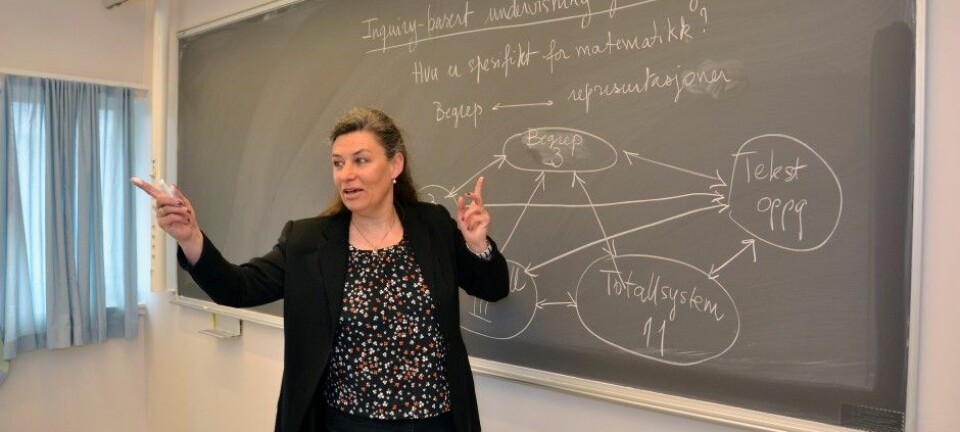
Highly educated teachers don’t translate into high student grades
Good grades in primary school and highly educated parents matter more than having highly educated teachers, according to a new study.
Denne artikkelen er over ti år gammel og kan inneholde utdatert informasjon.
Talented teachers make a difference for student performance, research shows. But exactly how they are related is less clear.
Now researchers have checked the grades of more than a hundred thousand students in Norwegian secondary schools to look for a correlation with teacher competence. Their findings might surprise you.
How much education is enough?
Length of education, grades and years of professional experience among teachers—none of them appear to guarantee strong student achievement, according to the recent study led by Pål Schøne of the Institute for Social Research at the University of Oslo.
“These are measurable, relevant variables that can reflect teachers' productivity either directly or indirectly,” Schøne told forskning.no, and they have also been used in previous studies.

These study results contradict what many politicians have claimed.
Norway’s Minister of Education and Research, Torbjørn Røe Isaksen, believes that continuing education and subject specialization are important for teachers, and he also notes that school research is inconsistent.
“Other studies show that the effect of teachers' specialized training is positive for primary school students. Especially in mathematics, these students achieve better academic results on national tests and leaving examinations if they have teachers with higher formal qualifications,” Røe Isaksen says.
These findings are from an earlier study carried out by the Centre for Economic Research at NTNU. Another study also showed that teachers with a few extra credits in mathematics have much better students. Beyond this, the effect of giving teachers more training in math decreases.
Interaction and feedback

But teachers’ interaction with students and their ability to give feedback seem to be the most important variables, Røe Isaksen adds.
He believes that the new Master’s degree programme for teachers that the government is preparing to introduce, will have positive effects for student learning.
“The sum total of the research that we’re basing our decisions on makes us confident that these stricter specialization requirements will work. But there's no sense in deepening teachers’ subject area training if they lack the ability to teach effectively. They also have to acquire pedagogical skills, so they can share what they know,” Røe Isaksen said.
The Minister hopes this will also provide greater opportunity for teachers to teach more freely, with less dependence on the curriculum. He also believes there is much to gain by making it more attractive to be a teacher, such as through better wages.
Teacher stability is good

The only variable that researchers found to have a positive effect was the length of time teachers had worked at the same school. This particularly affected the mathematics grades.
For each additional decade teachers had worked at the school, students' grades increased somewhat. So this was only a weak correlation, Schøne said.
Surveyed 111,400 students
Researchers based their analysis on registry data of over 111,000 college-bound secondary students from 2003-2008.
The study linked students’ exam grades with teacher data from the individual schools during this time period. It also controlled their findings for other potential factors such as parental education and students' primary school grades.
Researchers measured teachers’ length of education, their grades and how long they had been teaching. The study was a test of whether the teachers who were considered to be the best students during their university studies, were also is the best teachers later, according to the researchers.
The new study suggests that this is not the case.
Earlier grades and parental education
Students in the study were divided into four groups according to their grade point averages from lower secondary school. Researchers found that student achievement in upper secondary school had a strong positive correlation with earlier school grades.
There was also a strong positive relationship between parental education and children's achievement. Students who had at least one parent with a college education got better grades than students with parents who had only primary or secondary school educations.
Parental income, on the other hand, played no role.
A previous study showed that primary school grades also depend on the parents' education. The study concluded that social inequalities in Norwegian schools are on the rise.
The new study says nothing about teachers’ influence on the dropout rate, since only data for graduated students were part of the study. The researchers also found no differences between boys and girls.
Indefinable teacher qualities
A lot of research shows that teacher quality is important, but studies often have trouble identifying exactly what those qualities are. Some schools have students who do better, even when students have the same point of departure.
“This may be because some teachers are better than others. But the problem is just that teachers have some characteristics that aren’t that easy to measure,” says Schøne.
It may be that these teachers are better educators, more engaged, enthusiastic or better at motivating students. “Or that they have more authority or create a safer learning environment. We don’t know,” adds Schøne, “because qualities like these are difficult to measure.”
Study weaknesses
One weakness of the study is that researchers do not have the ability to connect individual teachers with students. Teacher data are compiled annually for each school, so researchers don’t know which teachers students had.
“So our study couldn’t identify individual teachers’ contributions. But it does give a good measure of the overall contribution of teacher resources at the schools,” says Schøne.
Ines Hardoy from the Institute for Social Research was also a researcher for this study. She said the researchers would have liked to be able to connect students with individual teachers.
Although Norwegian registry data is much richer than in other countries, it is a weakness not to be able to link this data. This is possible in a number of other countries.
“It would be a great advantage for various research purposes if we got that opportunity,” Hardoy says.
There is a lot of sensitive data that is difficult to get permission to use. In this case, it is not compiled anywhere, she explains.
-------------------------------------
Read the Norwegian version of this article at forskning.no



































